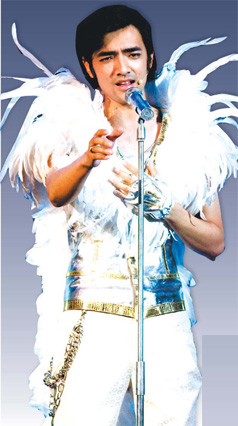"The tone of the song is embodied in a context which cannot be found in a pop song," Xiao Ke says.
As such the composer prepared for his musical by taking part in drama performances at small theaters in Beijing.
"Making a pop song is like summarizing the theme of a story, while writing lyrics for a musical is another thing, it is more like telling a complete story, adding flesh and bones."
China's musical theater industry has developed during the past few years as productions like Cats and Phantom of the Opera, presented by Chinese performers in English or Chinese, have been shown.
But there were no locally produced musicals.
 |
|
The nation's first pop musical features cool costumes, such as seen on Guo Peng who plays singer Bo Fan. [File photos]
|
"I didn't start making a musical until 2007 because I thought musicals were an imported culture. I thought it was just like Western audiences watching Peking Opera," Xiao Ke says.
It was friends and colleagues from the music industry who changed his mind.
"Actually, musicals have no boundaries. They can be interesting and attractive to Chinese audiences as long as they have a good story and are emotionally touching."
"There is no big band or orchestra or large set. (The production) is plain but every tune is catchy," he adds.
Music producer Song Ke agrees with Xiao Ke's approach: "A musical needs to have songs that are pleasant to the ears, this is most important. This is a good start."
Xiao Ke's musical career started at the age of 12, playing the piano. He set up his own band at 19 and taught at a middle school for three years before becoming a full-time musician.
He started as a campus folk singer and gradually developed as a composer and music producer. He released five albums but his compositions for TV operas and pop stars were more successful, often topping the music charts.
He rose to fame 10 years ago by making music for the TV series Bring Love Through. Last year, he led numerous pop singers from Hong Kong, Taiwan and the mainland to sing one of the most memorable Olympic hit songs, Beijing Welcomes You.
As a Beijinger, Xiao Ke says his music is like the city's people: straight, warm-hearted and sometimes stubborn. "The lyrics are like a daily conversation which is comfortable to hear and easy to sing," he says.
He believes that musicals have great market potential. The majority of fans for Whereby I Love You are from 20 to 35 years old, mostly graduates.
"Pop music should be discovered and promoted by the people with the most active minds. They dream and judge freely. The newest art forms are usually accepted by students on campuses, or even originate from campuses."
In 2002, he set up a company to promote his music and he also has his own music school. Currently, he is planning a second musical with the same crew from Whereby I Love You.
"Chinese people will take time to embrace musicals as much as Westerners do. The key point is musicals must be enjoyable and close to the heart of their audiences," he says.
Whereby I Love You will play in Century Theater until mid August.
(China Daily July 7, 2009)